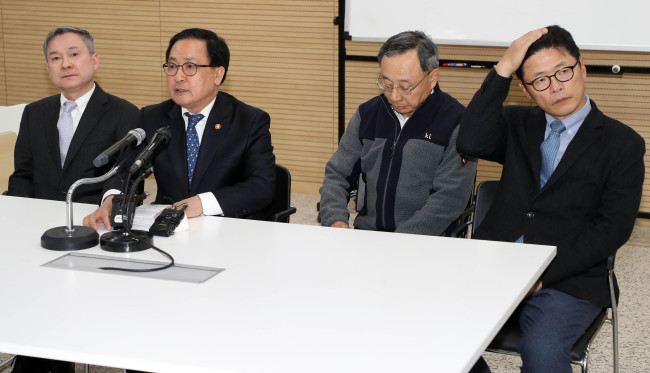South Korean telecom giant KT on Monday struggled to contain further fallout from the network blackout caused by a fire over the weekend, as it faces growing questions over its lack of safety measures.
Amid rising concerns over the incident that showed the IT powerhouse’s vulnerability to network paralysis, Minister of Science, ICT and Future Planning Yoo Young-min apologized for causing the public concern, saying that the government also feels responsible.
“The case revealed that not only telecom companies but also the government lacked countermeasures for emergencies,” he said in a press briefing, before holding an emergency meeting with the chiefs of KT, SK Telecom and LG Uplus in the afternoon.
“The government will seek safety measures together with the three major telecom companies by the end of the year.”
 |
Minister of Science, ICT and Future Planning Yoo Young-min (second from left) speaks at an emergency meeting with leaders of the nation’s three telecom giants -- LG Uplus Vice Chairman Ha Hyun-hwoi (left), KT Chairman Hwang Chang-gyu (second from right) and SK Broadband President Lee Hyung-hee -- at KT’s head office in Seoul on Monday. (Yonhap) |
The minister said he would discuss with the CEOs ways of establishing a joint response system to better deal with emergencies, like natural disasters and fires, and form a task force Tuesday to draft countermeasures.
The remarks came as politicians hold KT and the government responsible for the case that paralyzed banking services and mobile and other network-related services in parts of Seoul over the weekend, after a fire at the telco’s Ahyeon-dong base damaged key network equipment.
While there were no human casualties, KT’s landline, mobile and internet networks in the area suffered throughout the weekend after the fire hit communications equipment installed in the basement of the telecom company’s branch in central Seoul.
The Ahyeon branch is categorized as “Level D” in terms of network capacity, but the fire had profound impact, affecting nearly one-quarter of Seoul, Minister Yoo said, adding that the facility did not even have sprinklers.
“The law stipulates network paralysis as one of the social disasters, and if the country is moving toward a hyper-connected society, the Ministry of ICT should have been cautious,” said Rep. Lee Chul-hee of the ruling Democratic Party of Korea.
Politicians also lashed out at KT’s compensation plan, urging the telecom company to cover secondary damage suffered particularly by the owners of small shops.
Convenience stores, restaurants and cafes that use KT’s communication networks for credit card payment systems said the incident had seriously damaged their businesses over the weekend, with customers without cash forgoing purchases.
The company said it will waive affected customers’ bills for the month while devising ways to compensate the owners of small shops and corporate clients that suffered from the network damage, without revealing the size of compensation.
It is likely to take a while to compile the list of all subscribers who were affected by the incident, and the compensation plan will not cover all KT subscribers, an official said.
KT might have to pay around 31.7 billion won for compensation, around 12.7 percent of the mobile carrier’s operating profit of 250 billion won in the fourth quarter of last year, according to a report by KB Securities & Investment.
The size of KT’s compensation is likely to grow, as politicians are urging the company to fully cover for the damage, saying that the amount is not enough considering that the telecom giant generates 15 trillion won in annual revenue.
“There are business owners that had to shut down their businesses because they couldn’t accept credit cards due to network paralysis,” said Rep. Park Gwang-on of the Democratic Party. “(KT) should fully provide compensation for damage, so that carriers won’t be lax in making investments on safety measures.”
Under heavy fire, KT, the country’s top fixed-line operator, said it had completed fixing 84 percent of the mobile network and 98 percent of internet lines as of 11 a.m. A total of 2,380 out of 2,833 base stations had recovered as of 11 a.m., it added.
Despite concerns over the case causing inconvenience to financial services in the affected region, there was no report of service disruption on Monday, according to financial authorities.
On the first trading day after the network blackout, the share price of KT dropped 1.82 percent to 29,650 won at Monday’s close.
By Cho Chung-un (
christory@heraldcorp.com)





![[Exclusive] Hyundai Mobis eyes closer ties with BYD](http://res.heraldm.com/phpwas/restmb_idxmake.php?idx=644&simg=/content/image/2024/11/25/20241125050044_0.jpg)
![[Herald Review] 'Gangnam B-Side' combines social realism with masterful suspense, performance](http://res.heraldm.com/phpwas/restmb_idxmake.php?idx=644&simg=/content/image/2024/11/25/20241125050072_0.jpg)

